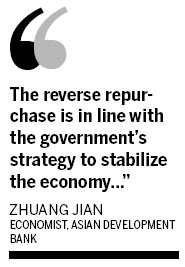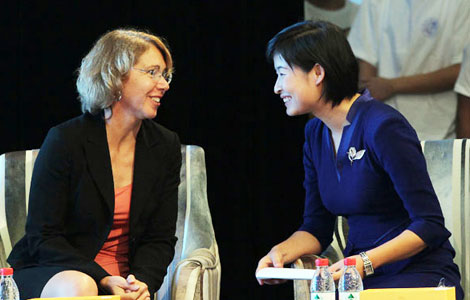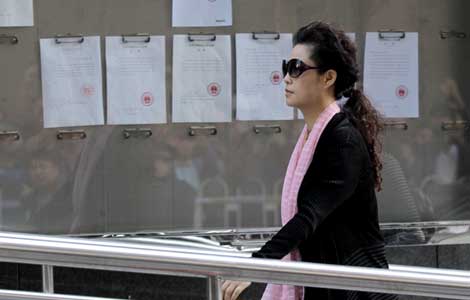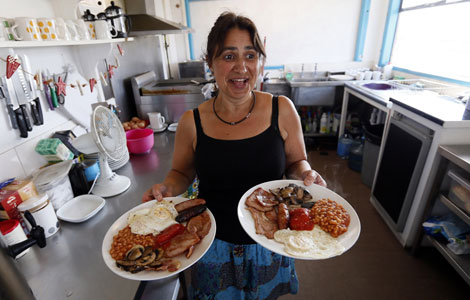PBOC moves to avert severe credit crunch
Updated: 2013-09-27 07:07
By Yang Ziman (China Daily)
|
||||||||
The People's Bank of China initiated an 80 billion yuan ($13 billion) reverse repurchase to prevent a severe credit crunch in the banking industry on Thursday.
The PBOC put 155 billion yuan into the open market during the last week in September. The bid is going to last for 14 days.
Statistics show this week, from Sept 21 to 27, the maturing central bank bills amounted to 5 billion yuan while maturing reverse repurchases stood at 18 billion yuan, putting the net credit injection at 13 billion yuan.
The central bank is unlikely to tolerate another credit crunch after the capital shortage in June that triggered an interbank borrowing frenzy, according to observers. Instead, it will use a short-term reverse repurchase measure to sustain liquidity.
"The move underlines the central bank's strategy toward the present capital condition, which is to abstain from pumping excessive funds into the industry," said Yan Yan, a senior broker at China Guangfa Bank.
Zhuang Jian, an economist at the Asian Development Bank, said: "The reverse repurchase is in line with the government's strategy to stabilize the economy and sustain the warming up of the economy. Plus a credit shortage is normal at the end of each quarter. Deposits are low because of the consumption surge triggered by the Mid-Autumn Festival and the imminent National Day holiday."

Deposits in the major four banks in China witnessed a 202 billion yuan loss in September as of Sunday, putting a dampener on the credit crunch at the end of the third quarter, Chinese media reported. The pressure on raising deposits has prompted banks to increase deposit interest rates.
China Guangfa Bank Co Ltd and China Everbright Ltd raised the mid- and long-term deposit interests by 10 percent at the beginning of the month.
China CITIC Bank International Ltd has recently raised its two-year interest rates from 3.75 percent to 4.125 percent.
Stagnant housing loans have also contributed to the capital shortage, reported the 21st Business Herald.
The loans do not look attractive to customers because many banks have failed to offer much of a discount in interest rates for first-time home buyers.
Housing loans bring relatively low profits to the portfolios of banks, said Guo Tianyong, finance professor at the Central University of Finance and Economics. As a result, it is understandable that banks squeeze housing loans when credit is tight, he added.
yangziman@chinadaily.com.cn
(China Daily USA 09/27/2013 page19)

 Making a wobbly stand on violence against women
Making a wobbly stand on violence against women
 Serena Williams back to Beijing for new crown
Serena Williams back to Beijing for new crown
 'Battle of the sexes' to start China Open
'Battle of the sexes' to start China Open
 US astronaut praises China's space program
US astronaut praises China's space program
 Christie's holds inaugural auction
Christie's holds inaugural auction
 Aviation gains from exchanges
Aviation gains from exchanges
 Early fish ancestor found
Early fish ancestor found
 Singers' son sentenced to 10 years for rape
Singers' son sentenced to 10 years for rape
Most Viewed
Editor's Picks

|

|

|

|

|

|
Today's Top News
US arms sales to Taiwan still sticking point
US Senate panel drafting bill to limit NSA spying
Popularity of Brazilian president rebounds: poll
UN to draft resolution on Syria's chemical weapons
China urges package deal on Iran's nuke issue
Can the 'Asian pivot' be saved?
Trending news across China
US firms pin hopes on financial liberalization
US Weekly

|

|







